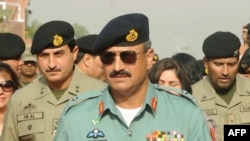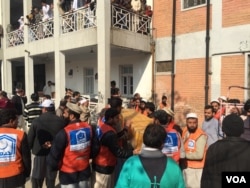Afghanistan’s spy chief visited Pakistan Thursday for bilateral talks with his Pakistani counterparts on building mutual trust for effective intelligence sharing and counterterrorism cooperation.
Intelligence sources told VOA that Masoud Andarabi, the head National Directorate of Security (NDS), met with Lt. General Rizwan Akhtar, the Director General of Inter Services Intelligence (ISI).
The Pakistani side said it presented “evidence” to show fugitive Pakistani militants are using Afghan soil to attack Pakistan.
Bacha Khan University attack
Islamabad alleges the deadly January 20 Bacha Khan University attack in the northwestern town of Charsada was planned and directed from the eastern Afghan border region.
At least 21 people, mostly students, were killed and all four attackers were shot dead in a firefight with security forces.
Pakistani officials, citing phone intercepts and interrogation from detained suspected facilitators, said the carnage was masterminded by Khalifa Umer Mansoor, commander of a splinter Pakistani Taliban faction, who is allegedly sheltering on the Afghan side of the border. There was no immediate reaction from Afghan authorities, though Kabul has already denied charges its soil is being used the plan attacks against Pakistan.
Mistrust and suspicions
Mutual terror allegations, years of mistrust and suspicions have marred bilateral relations and prevented Pakistan and Afghanistan from establishing closer security ties to fight terrorism.
Separately, a high-level Afghan military delegation visited Pakistani army headquarters in Rawalpindi for talks on security and border management issues.
The crucial military and intelligence chiefs’ talks happened ahead of Saturday’s meeting in Islamabad of senior diplomats from Afghanistan, Pakistan, the United States and China to promote Afghan peace and reconciliation efforts.
Afghan peace talks
The four-way contact group has held two meetings since early January and has been tasked with laying the ground for resurrecting direct peace talks between the Afghan government and Taliban representatives to end hostilities in Afghanistan.
The insurgent group, which is allegedly using sanctuaries in Pakistan, has not yet indicated whether it supports the four-way official peace process, or intends to come to the table for negotiations with Kabul.
Afghan and U.S. officials insist Pakistan, particularly its spy agency, ISI, can influence the insurgents to push them to the negotiating table.
Pakistani officials, however, deny suggestions they control the affairs of the Taliban, insisting Islamabad can only use its "limited influence" with the Afghan insurgency to persuade it to come to the peace talks.













